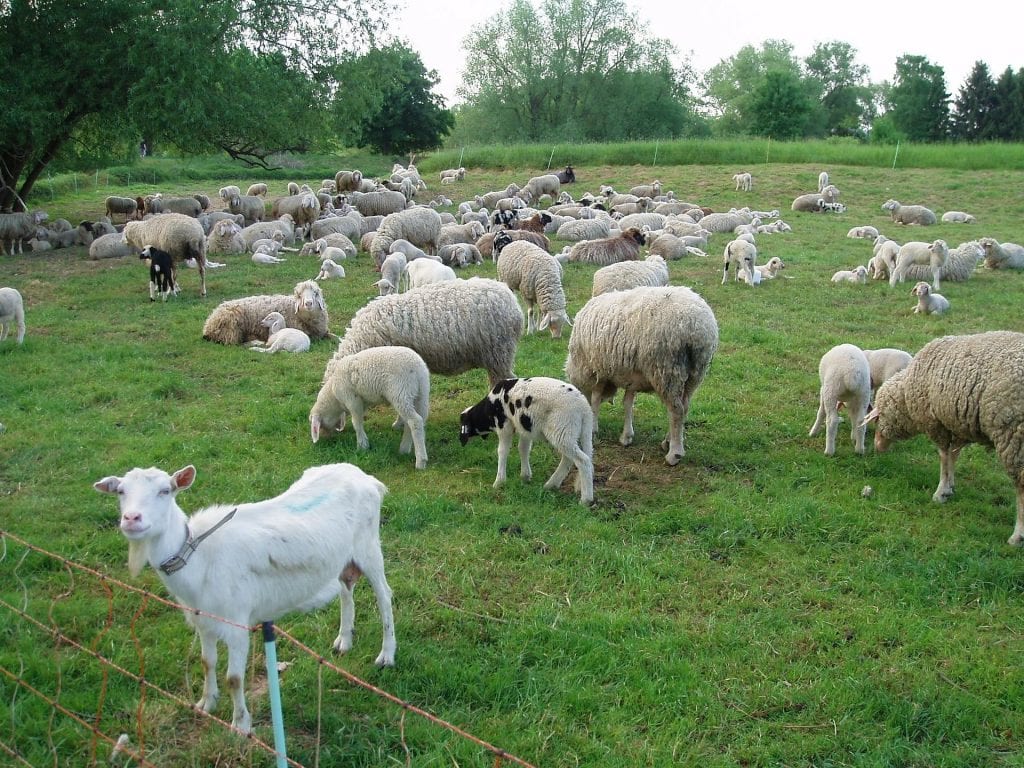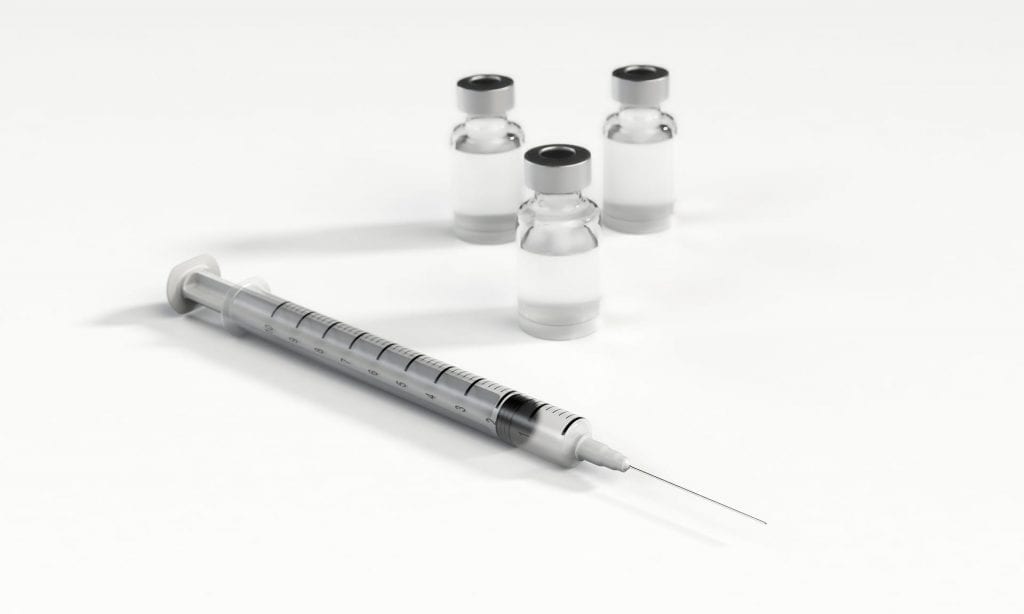

Why Do I Give Goats Sheep Vaccines?
Why oh why, would I give goats sheep vaccines? Seems counterintuitive right? We put horseshoes on horses, give cats cat food, and give goats… what? Another species’ vaccines? Are they getting shortchanged? The short answer is no, and the longer answer contains two reasons, one immunologic and the other administrative.
When you become infected with a pathogen, like rabies, a relationship between your body and the virus has begun; and like all relationships, it is both deeply personal and unique. When I say unique, despite the fact that rabies will kill you in the same way it will kill me, a goat, or even a bat how each individual animal’s immune system interacts with the virus is different. This difference is witnessed not just species to species but from one individual animal to another. Listen to our upcoming podcasts on MHC (Major Histocompatibility Complex) or attend one of our immunology courses to learn more about this. In short, when an immune system generates an antibody response, a series of antibodies will be made against the virus and attach in dozens of unique locations. This set of attachment locations is based upon your DNA, and like a fingerprint, is unique.
Podcast: Free Audio File
If you prefer to listen to podcasts, feel free to play the audio version of this blog by clicking on the player above.
Podcast: Why Do I give Goats Sheep Vaccines?
Length: 8 minutes 56 seconds
Written and read by the author

Rabies is Named After the Goddess of Rage: Lyssa
Thus, this same identical virus promiscuously interacts with different individuals and species with similar but unique results. Rabies is named after the goddess of rage, Lyssa (for more, listen to our podcast on rabies). If you court her, she will make you go mad and destroy you, but you have the satisfaction that the relationship will be uniquely shared between you.
An important point here remains that often the same virus can infect many different species and hence the antigen (an aspect of the pathogen that your immune system responds to) is the same. A rabies vaccine for a human, dog, cat, horse, cow, ferret, sheep, or even a goat will bear the same antigen – a dead virus. However, before you go and try to save yourself two to three hundred dollars and vaccinate yourself with a horse rabies vaccine, there is a difference with human vaccines which we will talk about. So, don’t stop reading quite yet.

The US Government Requires Specific Testing for Vaccine Labeling
So, for a virus that infects multiple species, medicine uses the same antigen for different species’ vaccines. This explains why some vaccines can be labeled for several species at once. Since we know that each species can interact differently with an antigen or pathogen, the US government requires scientific proof that the vaccine will work in each species for a specific duration of time for a license to be granted. If you find a rabies vaccine that is labeled for horses, dogs, cats, and ferrets, you know that the USDA has reviewed properly-run studies, separate to each species, to prove protection for a specific time period.
This brings us back to goats. Based on what we have covered, a rabies vaccine labeled for sheep should work in goats but since we don’t see goats on the label does this mean that vaccine studies on goats just haven’t been conducted and/or submitted to the USDA? Yep, you got it.
Goats just aren’t popular enough to warrant the cost. I know, crazy right? Who doesn’t love goats? But let’s just look at the study cost – 50 thousand dollars is a conservative estimate to conduct a study that the USDA would require. That’s a significant cost to a biologics company, and it doesn’t cover the market research, marketing costs, label changes, government fees, scientific project team, etc.… Not to mention the time required.

Ferret Owners May Not Agree With the Government That They Are Minor Species
The Minor Use and Minor Species Animal Health Act of 2004, or what is affectionally called MUMS, allows the use of drugs in minor species despite labeling for major animals. We define major species as horses, dogs, cats, cattle, pigs, turkeys, and chickens. Minor species includes any species other than humans that are not a major species. Fish, goats, honey bees, and even sheep fall into this category.
This allows producers and veterinarians to utilize drugs and biologics for other species without finding themselves either without options or in potential legal trouble. This represents one example of “off-label use.” If a company wishes to specifically design or label a drug for a minor species, they may do so, but there is no requirement either way. For this reason, you will see labeled drugs and biologics for minor species such as sheep and ferrets, but you will also find producers and veterinarians routinely using non-labeled options for minor species.

Shakespeare Hold the Answer to Many Things
If someone asks you why you aren’t using a goat vaccine for your goat, you can simply respond, “The Minor Species Act approves this use.” If you want to get geeky, then you can start explaining the scientific reasons why to a degree we are all just mammals and thus respond in a very similar way to antigenic stimuli. Alternatively, you can quote Shakespeare and remind them that humans and many mammals are “hurt with the same weapons, subject to the same diseases, healed by the same means, warmed and cooled by the same winter and summer.” For the record, I have tried the last method with varying success, so you may want to try option 1 or 2 depending on the situation.
As we approach the end of the podcast, I said that I would talk about how human rabies vaccines differ and why you shouldn’t try injecting yourself with horse vaccines, or any other labeled-species rabies vaccine for that matter. Some species are more sensitive to anaphylaxis and other hypersensitivity reactions. Guinea pigs, for example, love to go into anaphylaxis; well, may not love it but they sure do react this way readily. As a result, they are commonly used as a research model for anaphylaxis. Before you feel too sorry for them, since I also love guinea pigs, the reason we use them is another species that is prone to hypersensitivity reactions is humans. As a result of this, along with a near-zero tolerance for adverse events from vaccines, the purity level of human vaccines is held to a much higher standard. Placing it into perspective, animal rabies vaccines typically cost a few cents in production per vaccine when done on a mass scale. Human rabies vaccines cost almost 30 dollars per vaccine to produce on a mass scale– that’s more than a thousand times difference in cost. As we discussed, it is the same antigen but requires vastly different filtration and production methods.

"The Fault, Dear Brutus, Is Not in Our Stars, but in Ourselves"
I spoke to a veterinarian recently who had a classmate who did try to save money by injecting himself with a dog rabies vaccine. Despite over 90 percent of graduating veterinarians being female, the fact that the individual was male somehow did not surprise me. Anyways, within hours his shoulder resembled a cantaloupe-sized Bing cherry and hurt like heck. Perhaps it was professional pride, but the vet student refused to go to the emergency room and admit what he had done. He is still alive, has a healthy shoulder, and a new perspective on self-vaccination.
So, the Minor Species Act opens the opportunity to provide prophylaxis and treatment to species that otherwise wouldn’t have access to many therapies. This allows veterinarians and producers working with veterinarians to better safeguard their flocks and herds. It provides a framework for legal and medical approaches. It does not, however, remove the need for common sense, the need to continually learn, or the need to respect proper vaccine use.
References and Additional Reading
Shakespeare, W. (1953). The Merchant of Venice (Shakespeare). Cambridge: Cambridge University Press.
[amazon_link asins='1118553985,1935660020,0199946647,130526892X,1607951789' template='ProductCarousel' store='vetzone-20' marketplace='US' link_id='aa3e86be-ce1c-11e7-ae16-0944a45c35a3']